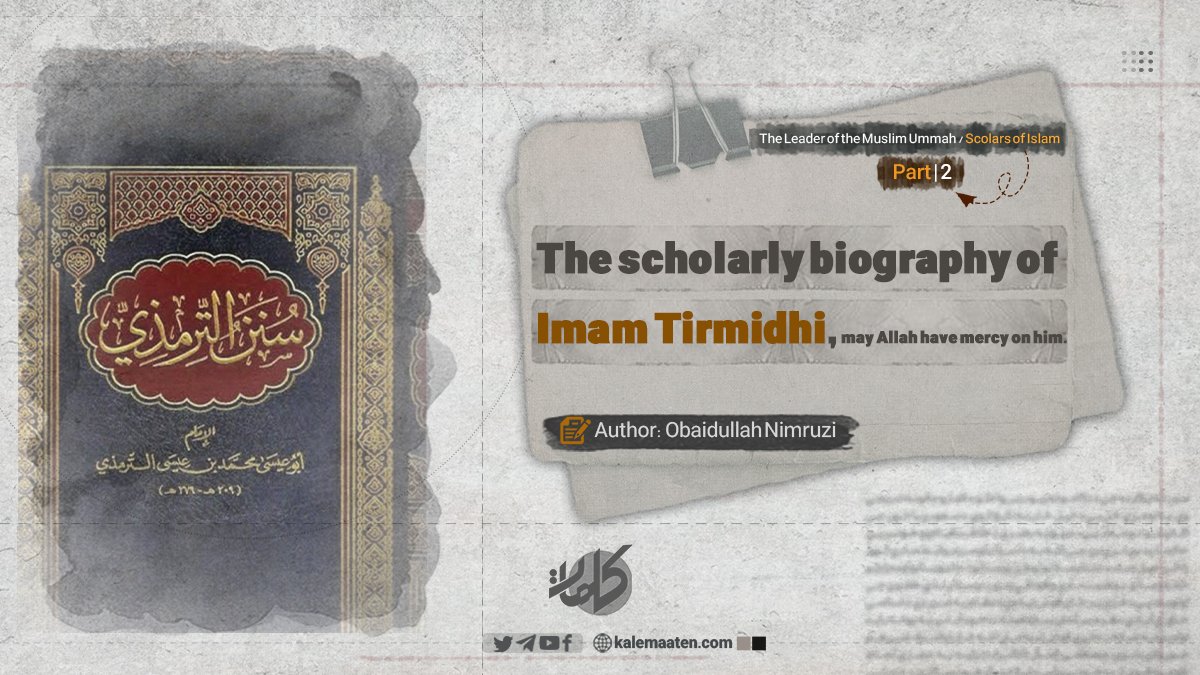
Author: Obaidullah Nimruzi
The Scholarly Biography of Imam Tirmidhi ‘May Allah Have Mercy on Him’ (Part Two)
Birth of Imam Tirmidhi
Scholars have presented varying opinions regarding the birth year of Imam Abu Isa Tirmidhi. Some historians and biographers mention his birth year as 209 AH, while others believe it to be 200 AH. However, Mawlana Taqiuddin Nadwi Mazahiri, in his book Muhaddithin-e-Azam Aur Unki Ilmi Karname, states: “The esteemed Imam was born in 205 AH in the region of Tirmiz.” Based on this account, it can be argued that Imam Tirmidhi was born in 205 AH; however, the most widely accepted opinion among scholars and researchers in the field of Hadith is that he was born in 209 AH into a scholarly and religious family.
Writings of Imam Tirmidhi
In addition to his renowned book, Jami’ Tirmidhi, Imam Tirmidhi authored several other works. Unfortunately, many of these works have been lost over time due to various events, and only their names remain. The most notable works authored by Imam Tirmidhi include:
1. Jami’ Tirmidhi
2. Ash-Shama’il An-Nabawiyyah wa Al-Khasal Al-Mustafawiyyah (known as Shama’il Tirmidhi)
3. Al-‘Ilal Al-Kabir (or Al-‘Ilal Al-Mufrad)
4. Al-‘Ilal As-Saghir
5. Kitab Az-Zuhd
6. Kitab Al-Asma’ wa Al-Kuna
7. Kitab At-Tarikh
8. Kitab As-Sahaba
9. Kitab Al-Jarh wa At-Ta’dil
10. Ath-Thulathiyyat
11. Ar-Ruba’iyyat
12. Al-‘Ashariyyat
13. Kitab Al-Mawquf
14. Risalah fi Al-Khilaf wa Al-Jadal wa At-Tarikh
Dr. Akram Dhiya Al-‘Umari, commenting on the works of Imam Tirmidhi, lists the following:
1. Jami’ Tirmidhi
2. Al-‘Ilal Al-Kabir
3. Ash-Shama’il
4. Az-Zuhd
5. Al-Asma’ wa Al-Kuna
6. At-Tarikh
7. Kitab Fi Al-Mawquf
8. At-Tafsir
He then adds: “Attributing Kitab Al-Jarh wa At-Ta’dil and Ar-Ruba’iyyat Fil-Hadith to Imam Tirmidhi is merely speculative.” Consequently, most scholars agree that Imam Tirmidhi did not author Kitab Al-Jarh wa At-Ta’dil or Ar-Ruba’iyyat fil-Hadith. It is believed that Ar-Ruba’iyyat fil-Hadith is the work of Hafiz Yusuf bin Shahin, a descendant of Ibn Hajar, who abridged and extracted Hadiths from Jami’ Tirmidhi. Regarding Kitab Al-Jarh wa At-Ta’dil, some researchers, including Dr. Akram Dhiya Al-‘Umari, suggest a transcription error in Al-Bidaya wa An-Nihaya.
Teachers of Imam Tirmidhi
Some of the notable teachers of Imam Tirmidhi that we can name are:
1. Qutaybah ibn Sa’id
2. Ishaq ibn Rahwayh
3. Muhammad ibn Ismail Al-Bukhari
4. Muhammad ibn Amr As-Sawaq Al-Balkhi
5. Mahmud ibn Ghailan
6. Ismail ibn Musa Al-Fazari
7. Ahmad ibn Mani’
8. Abu Mus’ab Az-Zuhri
9. Bishr ibn Mu’adh Al-‘Aqadi
10. Al-Hasan ibn Ahmad ibn Abi Shu’ayb
11. Abu ‘Ammar Husayn ibn Harith
12. Abdul Jabbar ibn Al-‘Ala’
13. Abu Kurayb
14. Ali ibn Hujr
15. Amr ibn Ali Al-Fallas
16. Imran ibn Musa Al-Qazzaz
Students of Imam Tirmidhi:
Some of the prominent students of Imam Tirmidhi include:
1. Abu Bakr Ahmad ibn Ismail As-Samarqandi
2. Abu Hamid Ahmad ibn Abdullah ibn Dawud Al-Marwazi
3. Ahmad ibn Ali ibn Hasanwiyah Al-Muqri
4. Ahmad ibn Yusuf An-Nasafi
5. Asad ibn Hamduyah An-Nasafi
6. Husayn ibn Yusuf Al-Faribri
7. Hammad ibn Shakir Al-Warraq
8. Dawud ibn Nasr ibn Suhayl Al-Bazdawi
9. Rabi’ ibn Hayyan Al-Bahili
10. Abdullah ibn Nasr, the brother of Dawud Al-Bazdawi
11. ‘Abd ibn Muhammad ibn Mahmud An-Nasafi
12. Ali ibn ‘Umar ibn Gulsum As-Samarqandi
Intelligence and Memory of Imam Tirmidhi
Imam Tirmidhi possessed an extraordinary memory and unparalleled scholarly aptitude. He narrated: “Once, while traveling to Mecca, I wrote down two chapters of Hadith from one of my teachers. As I was questioning him about the narrations and receiving answers, I continued writing. Suddenly, he noticed that I only had two blank pages in my hands. Surprised, he exclaimed, ‘Are you not ashamed of pretending to write?’ I explained the situation and told him I had memorized all the Hadiths. He challenged me to recite them, and I did so without a single mistake. Astonished, he said, ‘I do not believe you just memorized them now; you must have known them before.’ I replied, ‘If you doubt me, dictate another set of Hadiths.’ He recited forty additional Hadiths, and I repeated them all flawlessly.”
Continues…


